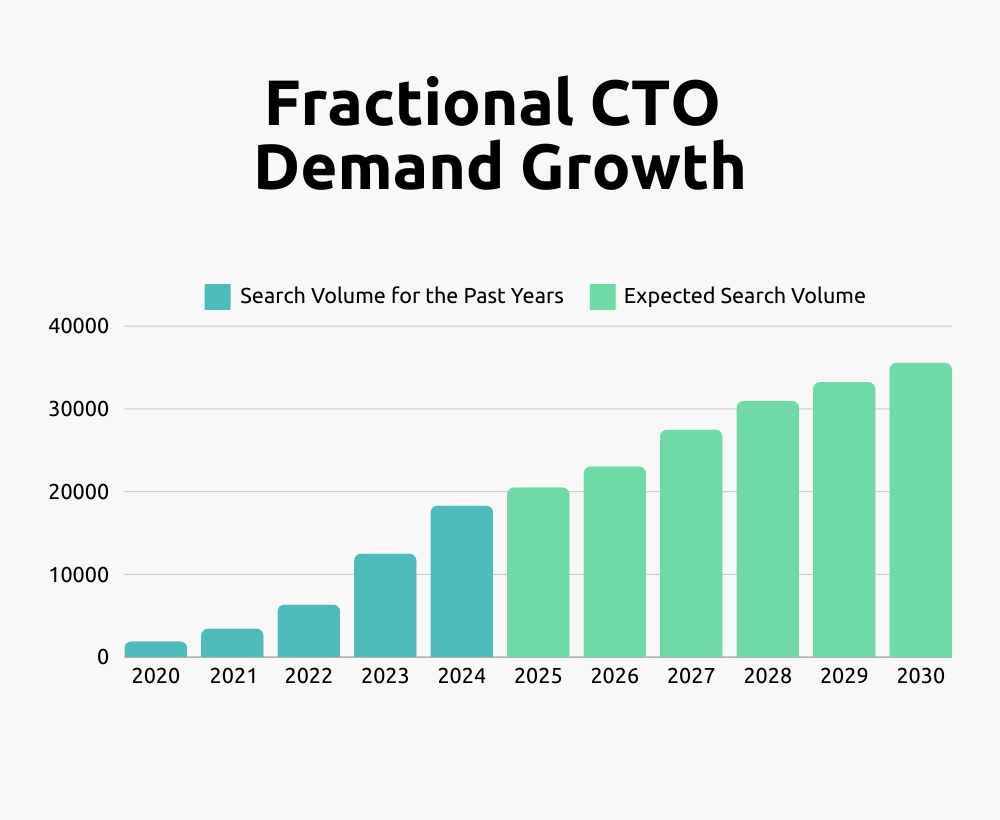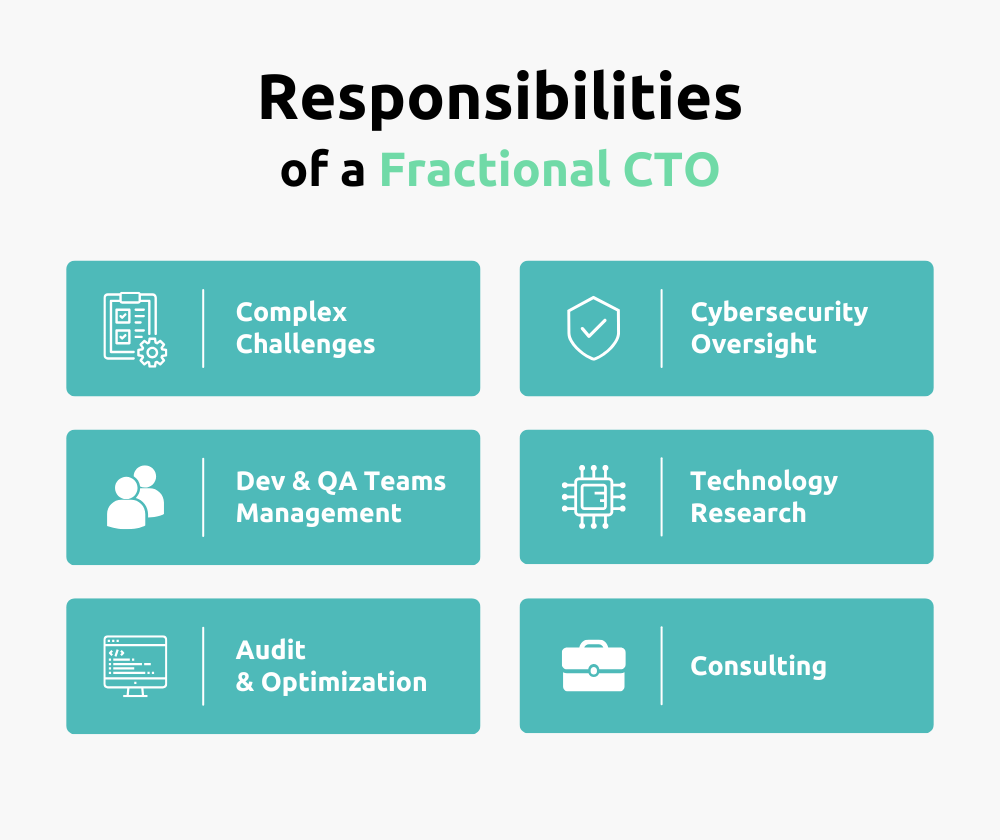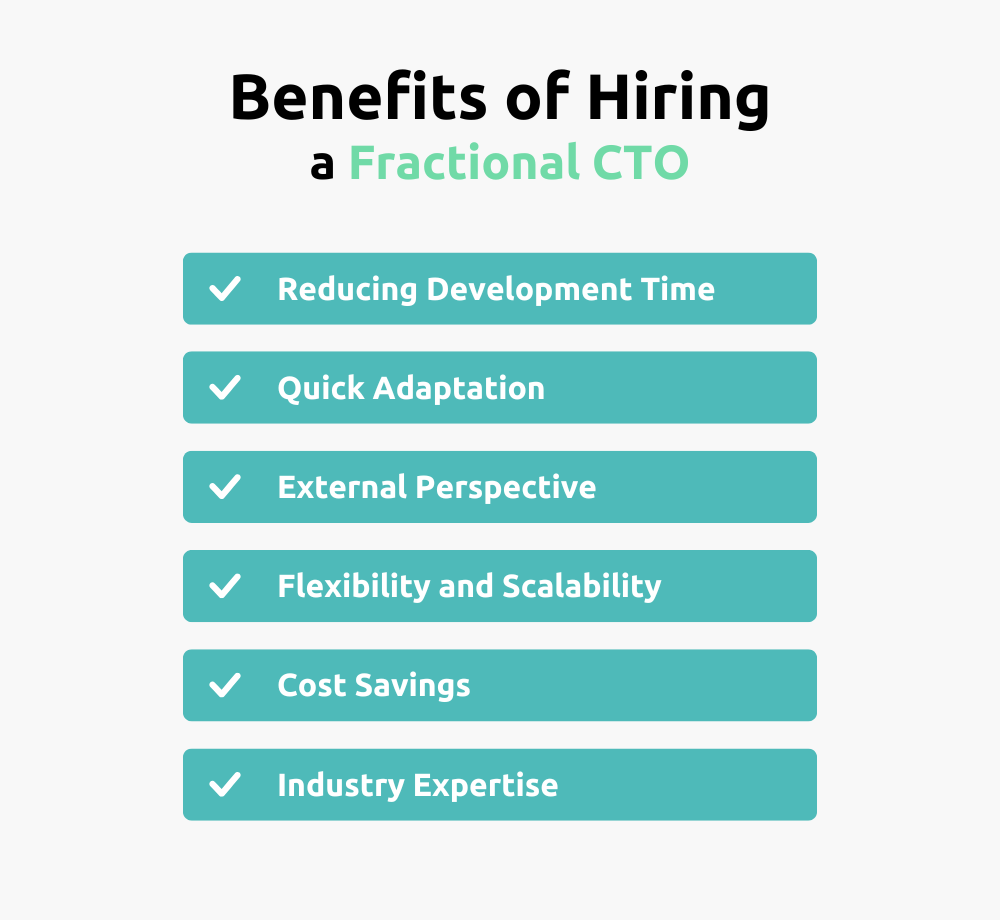Fractional CTO: The Role, Benefits, and How to Hire the Right One

Did you know that over 90% of startups fail due to poor business decisions, many of which stem from inadequate technology leadership? In a world where businesses rely on technology for everything from customer engagement to operational efficiency, having a strong technical strategy is a cornerstone. Yet, not every company can afford a full-time Chief Technology Officer (CTO).
Enter the Fractional CTO, a part-time technology leader who brings the same expertise as a full-time CTO but with greater flexibility and affordability. This role has become a game-changer for startups building scalable solutions, small businesses optimizing their resources, and established companies navigating digital transformation. A Fractional CTO helps businesses unlock their potential by accelerating product development, implementing cutting-edge technology, and future-proofing IT infrastructure - all without overstretching their budgets.
What Is a Fractional CTO
A Fractional CTO is a senior-level technology executive who works with businesses on a part-time, temporary, or project-based basis. Unlike a full-time CTO, they provide the technical expertise necessary to address specific challenges or guide critical initiatives without the long-term commitment.
As businesses increasingly prioritize flexible and efficient technology leadership, the demand for Fractional CTOs has grown exponentially. Our team conducted in-depth research, combining data from multiple reliable sources to analyze search trends and forecast future demand for this role. The chart below shows that interest has surged in recent years and is projected to continue its upward trajectory.

This research shows just how important Fractional CTOs have become for businesses today. They provide expert advisory to help companies align their technology with business goals and grow efficiently.
Responsibilities of a Fractional CTO
A Fractional CTO plays a pivotal role in steering a company’s technology initiatives. Despite their part-time or project-based nature, their responsibilities mirror those of a full-time CTO, ensuring businesses receive high-level strategic guidance and operational support.

Solving Complex Challenges
Fractional CTOs analyze intricate technological and business challenges, devising innovative solutions that align with the company’s goals. Their ability to think strategically and adapt to unique situations ensures effective problem-solving and decision-making.
Development and QA Teams Management
Overseeing technical teams is a core responsibility. Fractional CTOs provide leadership to development and QA teams, ensuring projects are delivered on time, within budget, and with the highest quality standards.
Audit and Optimization
Fractional CTOs conduct thorough audits of existing systems, processes, and infrastructure to identify inefficiencies and opportunities for improvement. They implement optimizations to enhance performance, scalability, and reliability.
Technology Research and Development
Staying ahead of emerging technologies is critical for any business. Fractional CTOs evaluate and recommend tools, platforms, and technologies that can drive innovation, streamline operations, and give the company a competitive edge.
Cybersecurity Oversight
No business can afford to mess up with cybersecurity. Fractional CTOs design and enforce security protocols to protect sensitive data, ensure compliance with regulations, and mitigate risks associated with cyber threats.
Consulting
As trusted advisors, Fractional CTOs provide insights and recommendations on a wide range of topics, from scaling infrastructure to implementing new technologies. Their strategic input helps businesses align their technical direction with long-term objectives.
When to Hire a Fractional CTO
A Fractional CTO is an ideal solution for businesses that need high-level technical expertise but may not require or cannot afford a full-time executive. Here are the key scenarios when hiring a Fractional CTO can benefit your business:
Lack of Tech Leadership
If your organization struggles with aligning technology strategy with business goals, a Fractional CTO can provide the leadership needed to set a clear direction, make informed decisions, and ensure technology drives growth.
Startups
Startups often face limited resources but require expert guidance to build scalable, robust systems. A Fractional CTO brings strategic insight and technical expertise to help startups navigate critical stages.
Small and Medium-sized Businesses
SMEs may not have the workload to justify a full-time CTO but still need someone to oversee technology decisions, optimize systems, and implement cost-effective solutions. A Fractional CTO offers flexibility while meeting these needs.
Digital Transformation
Companies undergoing digital transformation often need a technology leader to guide them through integrating new tools, automating processes, or modernizing legacy systems.
Crisis Management
In times of technological crisis, such as a major security breach or system failure, a Fractional CTO can step in to provide immediate leadership, identify solutions, and mitigate risks.
Limited Budget
For businesses with tight budgets, hiring a Fractional CTO provides access to top-tier expertise without the expense of a full-time hire. This makes it a cost-effective solution for companies looking to improve their ROI on technology investments.
Benefits of Hiring a Fractional CTO

Reducing Development Time
A Fractional CTO streamlines development processes, ensuring projects are completed faster by leveraging efficient workflows, tools, and team management strategies.
Quick Adaptation
Fractional CTOs are adept at stepping into fast-paced environments and quickly understanding business challenges, enabling them to provide immediate value and drive innovation.
External Perspective
Bringing an outsider’s view, a Fractional CTO identifies blind spots and offers innovative solutions that internal teams might overlook, helping businesses think strategically and stay competitive.
Flexibility and Scalability
Fractional CTOs offer the flexibility to scale their involvement based on business needs, making them ideal for startups or companies in transitional periods.
Cost Savings
By hiring a Fractional CTO, businesses can access top-tier expertise without the expense of a full-time salary and benefits, making it a cost-effective solution for tech leadership.
Industry Expertise & Experience
They often have extensive experience across multiple industries, allowing them to bring best practices and proven strategies tailored to specific business needs.
Potential Disadvantages of Hiring a Fractional CTO
While hiring a Fractional CTO offers numerous benefits, it’s essential to consider potential drawbacks businesses might face:
Limited Availability
Fractional CTOs usually divide their time among multiple clients, which may limit their availability during critical moments. This could pose challenges for businesses that need constant or on-demand leadership.
Solution: Set clear expectations and establish communication to ensure timely access when needed.
Possible Lack of Company Culture Fit
As part-time contributors, fractional developers may not fully integrate into your company culture or develop deep relationships with the team.
Solution: Choose a Fractional CTO with excellent interpersonal skills and conduct a thorough onboarding process to align their approach with your company’s values.
Fractional CTO vs. Full-Time CTO vs. Interim CTO
When deciding on the type of Chief Technical Officer that best suits your business, it’s important to understand the differences between a Fractional CTO, a Full-Time CTO, and an Interim CTO. Each brings unique advantages and is suited to specific business needs.
| Aspect | Fractional CTO | Full-Time CTO | Interim CTO |
|---|---|---|---|
| Commitment | Part-time/project-based | Permanent | Temporary |
| Cost | Affordable | High | Medium-High |
| Focus | Flexible, based on business needs | Long-term strategic goals | Short-term transitional goals |
| Availability | Limited/shared with other clients | Fully dedicated | Limited to transitional period |
| Best For | Startups, SMEs, short-term needs | Established businesses | Crisis management, leadership gaps |
Fractional CTO
A Fractional CTO brings flexibility and adaptability to businesses that don’t require a full-time technology leader but still need strategic expertise. These professionals work on a part-time or project basis, tailoring their involvement to the company’s specific needs. By working with multiple organizations, Fractional CTOs often bring a breadth of cross-industry experience, which can result in creative solutions. However, since their time is shared among clients, their availability may be limited, requiring clear planning.
Full-Time CTO
A Full-Time CTO is a permanent and deeply integrated member of a company’s leadership team. They oversee all aspects of the organization’s technology strategy, from managing IT infrastructure to driving long-term innovation. A full-time CTO is ideal for larger businesses or those with consistent and complex technical needs. Their full dedication allows them to develop a profound understanding of the company’s goals and operations. However, the cost of hiring and retaining a full-time CTO, including salary, benefits, and overhead, makes this option less accessible for smaller organizations.
Interim CTO
An Interim CTO, on the other hand, is a temporary solution, often stepping in during a transitional period, such as when a full-time CTO leaves or during a significant company transformation. These professionals are skilled at quickly assessing the situation, stabilizing operations, and providing leadership during a crisis or period of rapid change. While they are highly effective at maintaining continuity and addressing immediate challenges, their role is inherently short-term, and their focus may not always align with the company’s long-term vision. Once their assignment is complete, the organization may still need to invest in finding a permanent solution.
Why Businesses Are Turning to Fractional CTO Services
Businesses today are looking for agile solutions to meet evolving technology demands, and Fractional CTO services fit the bill perfectly. Here’s why more businesses are choosing this option:
Cost-Effectiveness
One of the most compelling reasons to hire a Fractional CTO is their affordability. For small-to-medium-sized businesses, hiring a full-time CTO can be prohibitively expensive. A Fractional CTO offers access to the same level of expertise but at a significantly more affordable cost. Businesses only pay for the services they need. This allows companies to optimize their budget while still gaining access to top-tier technical leadership.
Remote and Hybrid Working Trend
The rise of remote and hybrid work models has reshaped how businesses operate, making flexibility more important than ever. Fractional CTOs often work remotely, seamlessly integrating into teams regardless of physical location. This aligns perfectly with businesses that have embraced distributed workforces, enabling them to access the best talent without geographic limitations.
Scalability Needs
As businesses grow, their technology infrastructure must scale to meet increasing demands. Fractional CTOs are ideal for organizations navigating these transitional periods. They can step in to assess current systems, design scalable solutions, and implement strategies that support sustainable growth. Unlike a full-time hire, whose mentorship might not be fully utilized during periods of stability, a Fractional CTO can scale their involvement up or down based on the company’s evolving needs.
Short-Term Projects
Some organizations require specialized expertise for specific initiatives, such as developing a new product or migrating to a new platform. Fractional CTOs excel at delivering results for such projects. With their experience and ability to quickly adapt to new environments, they provide immediate value. Once the project is completed, businesses can scale back or conclude their engagement, making this model both practical and cost-efficient.
How Much Does a Fractional CTO Cost
The cost of hiring a Fractional CTO can vary widely depending on several factors, including the level of expertise required, the scope of responsibilities, and the engagement model. Businesses have the flexibility to choose between hourly rates, monthly retainers, or project-based pricing, depending on their specific needs.
At WiserBrand, we offer flexible pricing to meet the needs of businesses of all sizes. Our Fractional CTO services are priced at $150 to $200 per hour, with monthly retainers starting at $10,000.
Which Qualities Should You Look for in a CTO
Selecting the right CTO is critical to ensuring your business achieves its technology goals. A CTO is not just a technical leader but a strategic consultant who helps align technology initiatives with overarching business objectives. Here are the top qualities to consider when hiring a CTO:
Key Skills and Experience
A strong CTO brings a technical background combined with strategic business acumen. Look for expertise in relevant technologies, systems architecture, and innovation. Beyond technical skills, a CTO should be proficient in problem-solving and communication. The ideal candidate will have the ability to manage technical teams, oversee complex projects, and make decisions that align with your company’s goals. Their experience should reflect a balance of technical depth and the ability to see the bigger picture.
Alignment with Company Vision
A CTO must understand and embrace your company’s vision, ensuring that technology initiatives support long-term goals. Whether it’s driving digital transformation, launching new products, or scaling operations, the right CTO should have a strategic mindset and the ability to adapt technology plans to your unique business needs. Alignment with your culture, values, and mission is equally important, as this ensures seamless collaboration with other departments and leaders.
Proven Track Record in Similar Industries or Projects
Industry-specific knowledge can make a significant difference in how effectively a CTO addresses your company’s challenges. A proven track record of success in similar industries or with comparable projects demonstrates their ability to deliver results. For example, if you’re in eCommerce, a CTO with experience in scalable online platforms and customer-centric technologies will add immediate value. Look for examples of their ability to solve challenges, implement innovative solutions, and drive measurable outcomes.
How to Get the Best Results from a Fractional CTO
Maximizing the impact of a Fractional CTO requires thoughtful planning and a well thought out approach. While Fractional CTOs bring extensive expertise and flexibility, ensuring alignment with your business processes is key to achieving the best outcomes. Here are the critical steps to make the most of this partnership:
Best Practices for Onboarding
Effective onboarding sets the foundation for success. Start by providing your Fractional CTO with a comprehensive overview of your business, including your technology infrastructure, current challenges, and goals. Share key documents such as project plans, roadmaps, and performance metrics to bring them up to speed quickly. Introduce them to the teams they’ll be working with, fostering a collaborative environment. The sooner they understand your organization’s operations and priorities, the faster they can contribute.
Effective Communication
Clear and consistent communication is paramount when working with a Fractional CTO. Establish preferred communication channels, such as regular check-ins via video calls, email updates, or project management tools. Use tools like Jira or Trello to keep tasks and priorities transparent. Encourage open dialogue to address questions or concerns promptly. By fostering strong communication, you’ll ensure alignment and maintain momentum on critical initiatives.
Setting Clear Expectations and Goals
Define the scope of the Fractional CTO’s role from the outset, including their responsibilities, deliverables, and performance metrics. Set specific, measurable goals tied to your company’s objectives, such as reducing development time, improving system scalability, or enhancing cybersecurity. Regularly review progress to ensure the CTO’s efforts remain aligned with your expectations. This clarity not only ensures accountability but also empowers the CTO to focus on what matters most to your business.
Key Trends Defining the Role of a Fractional CTO
As technology continues to evolve at a rapid pace, the role of a Fractional CTO is becoming increasingly critical for businesses seeking to stay competitive. These professionals are not only addressing current challenges but also helping companies navigate emerging trends. Here are the key trends shaping the role of a Fractional CTO:
Growing Demand for Technology
According to Statista, global spending on digital transformation is projected to reach $2.5 trillion in 2024, with expectations to climb to $3.9 trillion by 2027. With businesses relying more on digital tools and platforms, the demand for expert technology leadership has skyrocketed. Companies of all sizes are seeking Fractional CTOs to guide them through digital transformation, optimize their infrastructure, and ensure their technology aligns with business goals.
Adoption of AI and Automation
AI and automation are reshaping how businesses operate, enabling improved efficiency, smarter decision-making, and enhanced customer experiences. Fractional CTOs are at the forefront of integrating these technologies into workflows, whether through implementing machine learning algorithms, automating repetitive tasks, or personalizing customer interactions. Their expertise helps businesses unlock the full potential of AI while navigating its complexities.
Fractional CTO Case Studies
Curious about how a Fractional CTO can make a tangible impact on a business? Learn how this role works in real-world scenarios through these case studies:
Sustainable Electronics Startup
Our client, a sustainable electronics startup established in 2020, offers eco-friendly devices on their eCommerce platform. With a motivated management team but limited experience in technology leadership, the company faced challenges scaling their business and addressing infrastructure issues.
Challenges:
- Aligning technology infrastructure with current and future demands.
- Rationalizing documentation and setting clear goals.
Solutions:
- Conducted a comprehensive assessment of the tech infrastructure.
- Developed a detailed optimization plan with clear priorities.
- Improved documentation for seamless execution.
Results:
- Right-sized tech infrastructure, saving 25% in costs.
- Accelerated product development by 30%.
Stripe
Stripe, one of the most prominent online payment processing companies, recognized the importance of strategic technology leadership early in its journey. To strengthen its technical capabilities and set the stage for scalable growth, Stripe enlisted Greg Brockman as a part-time CTO. Brockman, formerly the CTO at Twitter, brought a wealth of experience in building reliable, high-performing systems, significantly contributing to Stripe’s success.
Challenges:
- Developing backend infrastructure capable of scaling with the company’s growth.
- Building internal tools to improve efficiency.
- Cultivating a strong engineering team.
With limited resources and a rapidly expanding scope of work, Stripe needed a technology leader who could balance strategic and operational demands while building the foundation for long-term success.
Solutions:
Greg Brockman joined Stripe as an engineer in 2010, gradually assuming more responsibilities that expanded into a CTO-like role. His contributions included:
- The development of Stripe’s server architecture and internal systems.
- He navigated the dual responsibilities of overseeing engineering projects and shaping the company’s technical roadmap.
- Brockman was instrumental in shaping Stripe’s engineering team, fostering a collaborative culture.
Results:
Brockman’s involvement had a transformative impact on Stripe’s early development:
- His leadership ensured Stripe could support exponential user growth and process billions in transactions securely.
- Stripe’s engineering team expanded under Brockman’s guidance, with a strong emphasis on hiring top talent.
- Brockman’s contributions to system design and development enabled Stripe to deliver an unmatched payment processing experience for businesses globally.
Alternatives to Hiring a Fractional CTO
While a Fractional CTO can provide significant value, it’s not the only option for businesses seeking technical leadership. Depending on your organization’s size, budget, and goals, you might consider one of the following alternatives:
Technical Co-Founder
For startups, a technical co-founder can be an excellent alternative to hiring a Fractional CTO. A co-founder brings not only technical expertise but also a vested interest in the success of the business. This level of commitment often leads to a deep understanding of the company’s vision and goals. However, finding the right technical co-founder can be a time-consuming process, and their involvement is typically more hands-on than strategic.
Tech Consultants
Tech consultants are ideal for businesses that need specialized expertise for specific projects. They can offer guidance on technology stack selection, platform migrations, or process improvements. Unlike Fractional CTOs, consultants often focus on delivering solutions for short-term challenges rather than providing ongoing strategic leadership. This makes them a great choice for one-off initiatives but less suited for companies seeking long-term tech direction.
Tech Lead or Senior Developer
For businesses with limited budgets, promoting or hiring a tech lead or senior developer might be a viable alternative. These individuals can handle day-to-day technical operations and oversee development teams. However, they often lack the strategic perspective and leadership experience of a CTO, which may limit their ability to align technology initiatives with broader business goals.
FAQ
A Fractional CTO is a senior technology executive who provides part-time or project-based strategic and operational leadership, delivering the expertise of a full-time CTO without the long-term commitment.
Hire a Fractional CTO when you need high-level tech leadership but can't justify a full-time hire, such as for startups, SMEs, digital transformation, crisis management, or short-term projects.
They provide cost-effective senior technical strategy, accelerate development through process improvements, and offer scalability and an external perspective to better align technology with business goals.
Costs vary by experience and engagement model, with common market ranges around $150–$200 per hour and monthly retainers starting near $10,000 as noted in the blog.
Onboard them thoroughly, define clear scope, goals, and metrics up front, and keep regular communication and reviews to ensure alignment with your business priorities.
